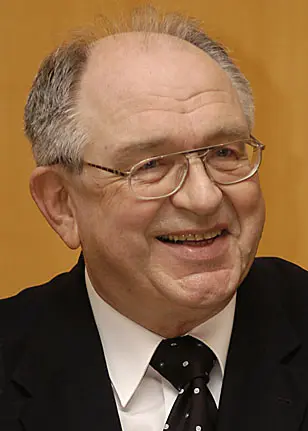Werner W. Franke, 1940 im ostwestfälischen Paderborn geboren, studierte in Heidelberg, promovierte in Biologie, Chemie und Physik und wurde 1971 von der Universität Freiburg im Fach Zellbiologie habilitiert. 1973 berief ihn die Universität Heidelberg als Professor an die Fakultät für Biologie. Seit dieser Zeit leitet er die Abteilung Zell- und Tumorbiologie im Deutschen Krebsforschungszentrum.
Auf dem Gebiet der Proteine des Zytoskeletts - des Eiweißgerüsts, das jeder Zelle Form und Festigkeit verleiht - zählt er zu den weltweit führenden Wissenschaftlern. Außerdem erforschten er und seine Mitarbeiter die Verbindungsstellen zwischen einzelnen Zellen, die als Ansatzpunkte für die Fasern des Zellskeletts dienen und so die Zellen untereinander zu einem Gewebe verbinden.
Die Proteinbestandteile des Zytoskeletts sind der Steckbrief jeder Zelle. Sie bleiben auch in Krebszellen unverändert und lassen daher Rückschlüsse auf das Ursprungsgewebe des Tumors zu sowie auch auf den Ursprung von Metastasen, die sich weit vom Primärtumor abgesiedelt haben. Werner Frankes Arbeit ermöglichte, Tumorzellen anhand der molekularen Eigenschaften dieser Proteine zu erkennen und zu klassifizieren. Aus Frankes Abteilung stammen zahlreiche spezifische Antikörper gegen die unterschiedlichen Komponenten des Zellskeletts, die heute weltweit in der Krebsdiagnostik eingesetzt werden.
Werner Franke, Autor von über 600 wissenschaftlichen Publikationen, gehört zu den weltweit meistzitierten Wissenschaftlern im Bereich der molekularen Biologie. Für seine Forschung wurde er mit zahlreichen Preisen ausgezeichnet, darunter dem Meyenburg-Preis, dem Deutschen Krebspreis und dem Ernst-Jung-Preis. Seit 2008 leitet Franke als „Helmholtz-Professor“ auch über das Erreichen des Pensionsalters hinaus eine Arbeitsgruppe für Zellbiologie am Deutschen Krebsforschungszentrum.
Der breiten Öffentlichkeit ist Franke vor allem als scharfer Doping-Kritiker und schonungsloser Aufklärer gegen alle Vertuschungsversuche des Drogenmissbrauchs im Leistungssport bekannt. Gemeinsam mit seiner Frau Brigitte Berendonk kämpft er seit Jahrzehnten unermüdlich gegen die kriminellen Machenschaften von Sportfunktionären und Sportmedizinern. Gemeinsam haben Franke und Berendonk das Staats-Doping in der ehemaligen DDR aufgeklärt und dokumentiert. Damit schufen sie die Grundlage für Strafurteile gegen viele der Hauptverantwortlichen, wie der Bundesgerichtshof in zwei Urteilen im Jahr 2000 ausdrücklich bestätigte. Für diesen langjährigen Kampf gegen das Doping im Leistungssport erhielten Franke und Berendonk 2004 das Verdienstkreuz am Bande des Verdienstordens der Bundesrepublik Deutschland.
Werner Franke ist ein Mann mit vielen Talenten. Neben seinem Studium war er nicht nur Leichtathlet und Leichtathletik-Trainer, sondern profilierte sich außerdem als professioneller Satiriker – er stand selbst auf der Bühne und schrieb Texte für berühmte Kabaretts und für das Fernsehen. Auch sein 70. Geburtstag ist für Werner Franke kein Grund, ans Aufhören zu denken. Weder als Wissenschaftler noch als Doping-Aufklärer. Professor Dr. Otmar D. Wiestler, Vorstandsvorsitzender des Deutschen Krebsforschungszentrums, erklärt: Wir sind stolz, eine Persönlichkeit wie Werner Franke weiterhin bei uns zu haben.“
Ein Bild von Werner Franke steht im Internet bereit unter
www.dkfz.de/de/presse/pressemitteilungen/2010/images/Franke.jpg
Bildquelle: Deutsches Krebsforschungszentrum
Über das DKFZ
Das Deutsche Krebsforschungszentrum (DKFZ) ist mit mehr als 3.000 Mitarbeiterinnen und Mitarbeitern die größte biomedizinische Forschungseinrichtung in Deutschland. Wissenschaftlerinnen und Wissenschaftler erforschen im DKFZ, wie Krebs entsteht, erfassen Krebsrisikofaktoren und suchen nach neuen Strategien, die verhindern, dass Menschen an Krebs erkranken. Sie entwickeln neue Methoden, mit denen Tumoren präziser diagnostiziert und Krebspatienten erfolgreicher behandelt werden können. Beim Krebsinformationsdienst (KID) des DKFZ erhalten Betroffene, Interessierte und Fachkreise individuelle Antworten auf alle Fragen zum Thema Krebs.
Um vielversprechende Ansätze aus der Krebsforschung in die Klinik zu übertragen und so die Chancen von Patientinnen und Patienten zu verbessern, betreibt das DKFZ gemeinsam mit exzellenten Universitätskliniken und Forschungseinrichtungen in ganz Deutschland Translationszentren:
- Nationales Centrum für Tumorerkrankungen (NCT, 6 Standorte)
- Deutsches Konsortium für Translationale Krebsforschung (DKTK, 8 Standorte)
- Hopp-Kindertumorzentrum (KiTZ) Heidelberg
- Helmholtz-Institut für translationale Onkologie (HI-TRON) Mainz – ein Helmholtz-Institut des DKFZ
- DKFZ-Hector Krebsinstitut an der Universitätsmedizin Mannheim
- Nationales Krebspräventionszentrum (gemeinsam mit der Deutschen Krebshilfe)
Das DKFZ wird zu 90 Prozent vom Bundesministerium für Bildung und Forschung und zu 10 Prozent vom Land Baden-Württemberg finanziert und ist Mitglied in der Helmholtz-Gemeinschaft Deutscher Forschungszentren.
